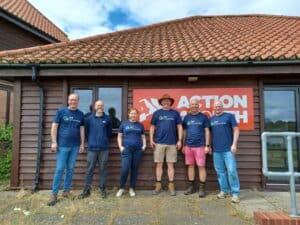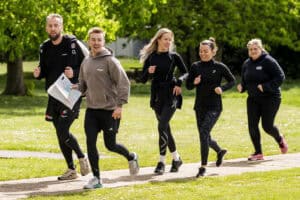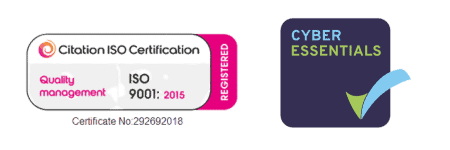
Addressing the Knowledge and Skills Gap in Careers Education
For students and soon-to-be graduates, entering the world of work can be a daunting prospect. While many schools do offer work placements during a student’s school journey, these are often short-term experiences that don’t allow students to gain deep insight into a working environment. Career advice is typically aimed at getting students through the door rather than equipping them with the practical skills and knowledge for what happens next in the workplace. This needs to change.
Here, Jenifer Cameron, CEO of Action4Youth, explores how we can combat the skills gap in careers education by preparing students with real-world community experience. Providing students with practical experiences not only in corporate environments but in charities, cultural institutions and local government helps students develop a broader skill set, empowering young people to become more well-rounded with better communication, teamwork and critical thinking skills so they can thrive in their future professions and beyond. All of this can help individuals to become more confident as they seek to open more potential career paths.
By definition, the knowledge and skills gap are the difference in the skills and expertise required for a particular job in contrast with the insufficient skills and knowledge held by a student or jobseeker. While students may leave school and university with adequate levels of knowledge in certain fields that could benefit them in the workplace, often they lack a broad skill set that will enable them to successfully complete their daily tasks.
What appears to be problematic is that employers, as a whole, do not believe schools prepare students with the necessary opportunities or skills for a modern-day working environment. There are two stand-out factors that influence how an employer determines the suitability of an employee; the importance of certain skills to the job, and the level of satisfaction that employers have in the graduates they choose to hire. A point can certainly be made to suggest that employers and employees have different expectations when entering a job, and that schools do not adequately prepare students for the world of work.
Increasing confidence
Levelling the playing field to support students from disadvantaged backgrounds so they are empowered to fulfil their potential is essential. This will enable students to feel more confident in their ability, preparing them more for the world of work. If a student increases their levels of confidence, learning new skills and developing current skills will naturally become easier, and less of a challenge for high school students, of whom even the highest achieving students are likely to feel uncertain as they venture into the workplace for the first time. This also means that, through levelling the playing field, increasing knowledge and skills will become a more enjoyable experience and feel like less of a chore for students. We must do everything within our power to ensure that all students can become more confident as a way to secure their future.
The role of community
It’s essential that the lack of real-world skills gained from a high school education is addressed, so that the next generation are given more opportunities to hit the ground running straight out of high school. This will enable graduates to develop one of the most vital transferable skills; the ability to communicate with colleagues, clients and potential business effectively. Arguably, there are substantial barriers between schools and the employer that must be broken down in order to reduce the knowledge and skills gap.
It’s vitally important for the community to take an active role to reduce the knowledge and skills gap. The newly created Education Inspection Framework (EIF) has been set out by Ofsted to make clear what its principles are and how inspectors reach their conclusions from school visits. One aspect Ofsted looks for is the inclusion of sufficient careers education through the ‘National Careers Service’. This government initiative offers free and impartial guidance to help with decision-making about careers. Through inspections, Ofsted will be able to determine whether institutions are providing helpful advice to students not only about what career paths are available, but also how these paths can be met.
Making a change
What also appears to be lacking amongst students and soon-to-be graduates is relevant real-world experiences that can give them a taster of what to expect in the workplace, and to develop new and existing skills. This is where Action4Youth’s initiative, The Inspiration Programme (TIP), comes into play. With an overall goal of better equipping young people for the world of work, it focuses on helping students to understand what their role in society is and to realise their future potential. Through this, the programme enhances existing provisions and creates brand new opportunities for young people. This includes giving access to important elements of our community: work life, arts and culture, police and criminal justice, community and environment as well as personal health and wellbeing.
Well-rounded careers education should demonstrate direct links to the foundation subjects within the curriculum, while linking to the real world. With this in mind, one of the most important parts of careers education and support is to provide students with the opportunity to engage in meaningful experiences with an added emphasis on allowing students to leave the classroom and enter real-life situations. For example, young people can be properly supported through effective training on the importance of welfare. It’s vital to give young people an understanding of just how important mental health is as well as physical health to their overall wellbeing, and what factors can contribute to this. This could include a combination of workshops, seminars and practical sessions so that students engage with the course from numerous perspectives. For example, approaches could vary from a workshop exploring the topic of self-confidence, a visit to an active fire station to learn about the importance of fire safety during an emergency or a discussion on various communication methods and the impact this can have on mental health and overall wellbeing. An open dialogue on wellbeing is equally as important as gaining real-life experiences that can better prepare students for the world of work.
In modern society, not enough students and soon-to-be graduates gain practical insights into a working environment through their studies. As a result, too many students are grossly unprepared for job applications, interviews and beginning their first job. To change this, we must provide students with all of the necessary resources that will enable them to flourish post-education. This will give students greater confidence in the relevant knowledge and skills both as a student and on the job. We must look beyond traditional education to find solutions to the knowledge and skills gap amongst young people, giving them everything they need to excel in an evolving working environment.
Please help us make this page more visible by sharing it through your own social networks.






